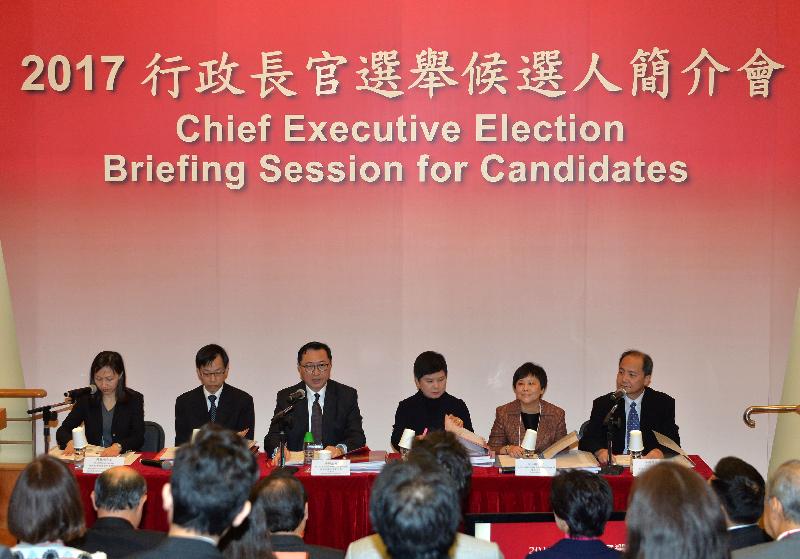Chief Executive Election candidates briefed on electoral guidelines and arrangements (with photo)
******************************************************************************************
The Chairman of the Electoral Affairs Commission (EAC), Mr Justice Barnabas Fung Wah, at a briefing session for the 2017 Chief Executive Election today (March 5) called on the candidates and their agents to strictly observe the relevant legislation and the electoral guidelines to ensure that the election will be conducted in an open, fair, honest and clean manner.
After the briefing session, the Returning Officer, Madam Justice Carlye Chu Fun-ling, drew lots to determine the order of names of the candidates on the ballot paper and the allocation of designated spots for display of election advertisements.
The order of names of the candidates on the ballot paper is: John Tsang Chun-wah (No. 1), Carrie Lam Cheng Yuet-ngor (No. 2) and Woo Kwok-hing (No. 3).
At the session, Mr Justice Fung emphasised that ballot is secret and conducted in a confidential manner, and the EAC attaches great importance to voting secrecy.
“According to the law, ballot papers will not be printed with numbers. Polling staff are prohibited from recording which particular ballot paper is issued to an elector. After being issued a ballot paper, the Election Committee (EC) member is required to enter a voting compartment alone to mark the ballot paper, fold the ballot paper inward and put it into the ballot box. At the polling station, each voting compartment is two-and-a-half-metre high and with a cover, and all recording devices of the closed circuit television system inside the polling station will be removed.
“In addition, EC members are not allowed to communicate with other electors inside the polling station, including, in particular, showing the vote on the ballot paper to others. They are also not allowed to use mobile telephones or any other device for communication purpose. Filming, photo-taking or making of any audio or video recording are also not allowed. EC members are not allowed to bring the ballot paper out of the polling station. To assist the Presiding Officer in enforcing the relevant regulation, they will be requested to switch off their mobile phones or other communication devices and put them away properly before entering the main polling station,” he said.
Mr Justice Fung also briefed candidates on other requirements in the electoral legislation and guidelines.
"The election expense limit for each candidate of this Chief Executive Election is $15.7 million. Candidates are required to submit to the Registration and Electoral Office (REO) a return of election expenses not later than 30 days after the gazettal of the election results. The return must cover all the election expenses incurred by the candidates or their authorised persons, all donations received in cash or in kind, and any unpaid claims," he said.
He briefed candidates the requirements concerning electioneering on TV and radio, and media reporting as set out in the electoral guidelines.
"During the election period, broadcasters should treat all candidates according to the fair and equal treatment principle. Candidates should also use their best endeavours to take part in election-related programmes in order to enable electors and the public to be apprised of their platforms.
"Candidates should avoid receiving unfair extra publicity. Other people and organisations should also avoid giving unfair extra publicity to any candidate in their activities," he said.
During the briefing session, Mr Justice Fung introduced the arrangements for polling and counting of votes in the election.
Voting for the Chief Executive Election will take place on March 26. The main polling station and the central counting station will be located at the Hong Kong Convention and Exhibition Centre. The first round of voting will be held from 9am to 11am. Should there be a need for more than one round of voting, the second and third rounds of voting will be scheduled from 2pm to 3pm and from 7pm to 8pm respectively on the same day.
Once the poll is closed, the ballot boxes will be delivered to the central counting station where vote count will take place. Candidates, election agents and counting agents may observe the entire counting procedure. Members of the public can also observe the counting process from a designated area inside the central counting station. After the completion of the count, the Returning Officer will announce the election result at the central counting station.
“The EAC attaches great importance to the maintenance of order at the main polling station and central counting station in the Chief Executive Election. Any behaviour which disrupts the order or violates the law will not be tolerated. The REO will deploy sufficient manpower to maintain order and handle any breach of the law. In the event that there is disruption or a breach of the law, cases will be immediately referred to the law enforcement agency for strict follow-up action,”Mr Justice Fung said.
Information on the Chief Executive Election is available on the election website (www.elections.gov.hk).
Ends/Sunday, March 5, 2017
Issued at HKT 17:02
Issued at HKT 17:02
NNNN





